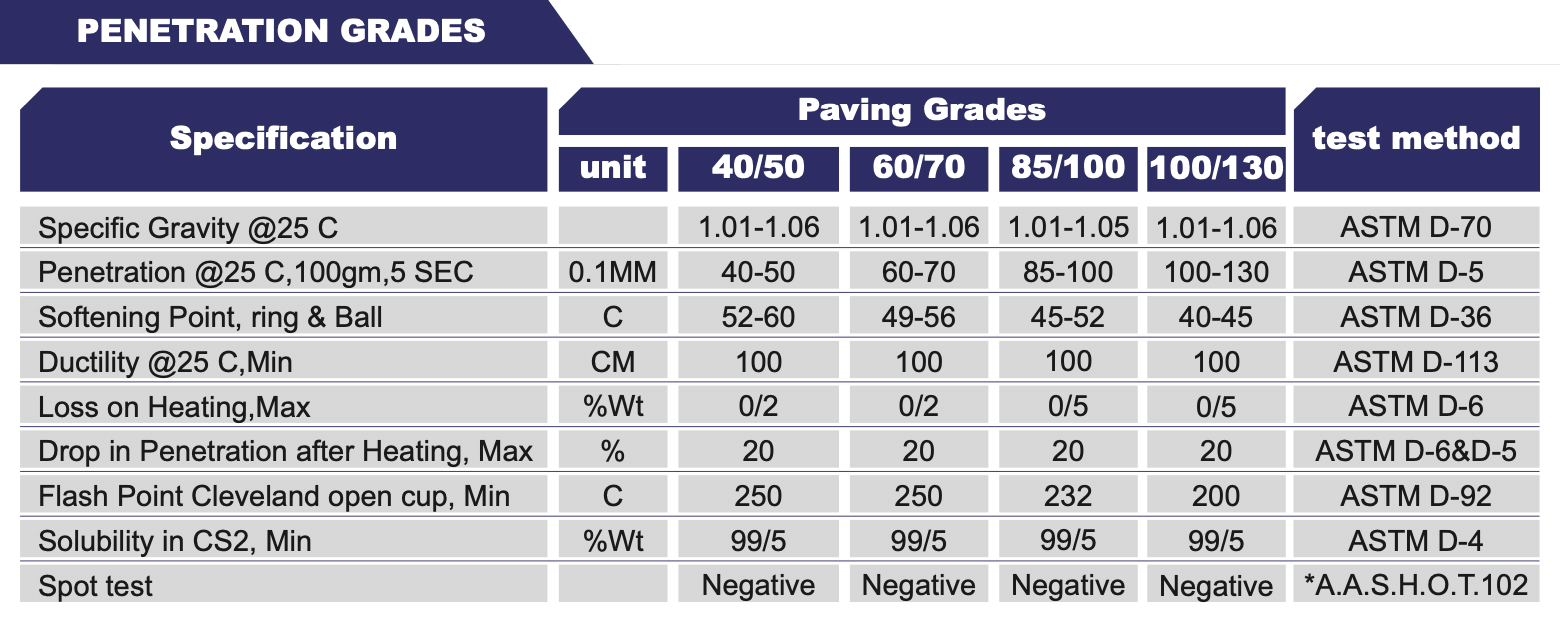Menu
60-70 / 85-100 / 40-50
Bitumen Penetration Grade is a standard penetration grade Bitumen usually used as a Paving Grade Bitumen suitable for road construction and for the production of asphalt pavements with superior properties. This grade of Bitumen is mainly used in the manufacture of hot mix asphalt for bases and wearing courses.
100-130
Road Bitumen 100/130 issued for construction and repair of road surfaces, designed for various types of road application such as hot asphalt and bituminous mixtures, recommended for regions with high temperate climates

VG-10
VG-10 is widely used in spraying applications such as surface-dressing and paving in very cold climate in lieu of old 85/100 Penetration grade. It is also used to manufacture Bitumen Emulsion and Modified Bitumen products
VG-20
VG-20 is usually used for paving in cold climate & high altitude regions
VG-30
VG-30 is primarily used to construct extra heavy duty Bitumen pavements that need to endure substantial traffic loads. It can be used in lieu of old 50/70 Penetration grade
VG-40
VG-40 is used in highly stressed areas such as intersections, near toll booths and truck parking lots in lieu of old 30/40 Penetration grade. Due to its higher viscosity, stiffer Bitumen mixes can be produced to improve resistance to shoving and other problems associated with higher temperature and heavy traffic loads.

All Petroleum air oxidized asphalt based products, refined from blowing hydro-carbon with special attention to temperature and pressure of blowing tower. We export all oxidized grade of bitumen including air oxidized asphalt 115/15 and 150/5 to soft grades as 75/25.

Oxidized bitumen 115/15 is semi solid oxidized grade of pure petroleum bitumen categorized in polycyclic aromatic hydrocarbons and oxidized bitumen normally used for different purposes in the construction business.
Oxidized bitumen 90/40 is semi solid oxidized grade of pure petroleum bitumen categorized in polycyclic aromatic hydrocarbons is normally used for different purposes in the construction business.
Oxidized bitumen 85/25 is semi solid oxidized grade of pure petroleum bitumen categorized in polycyclic aromatic hydrocarbons is normally used for different purposes in the construction business.

Oxidized asphalt in various types and grades as I,II,III including low, medium and high softening point with different penetration and hardness. The oxidized asphalt types including soft grades as 75/25 85/25 95/25 90/40 also medium grade oxidized asphalt 90/10 90/15 and hard grade including oxidized asphalt 115/15 110/15 105/5 105/15 105/35 and special ultra oxidized grades 150/5.
The properties of bitumen for road making are specified in AS 2008 Residual Bitumen for Pavements. This Australian Standard classifies and specifies the properties of conventional pavement-grade bitumen most widely used in Australia.

The following classes are most commonly used in sprayed sealing works in Australia:
Class 170: the most commonly used class for sprayed sealing
Class 240: higher viscosity binder (compared to C170) used by some road agencies in warm climates
Class 320: higher viscosity binder (compared to C170 and C240) sometimes used for sprayed sealing in areas where pavement temperatures or traffic stresses were high, but has been largely superseded by PMBs and multigrade bitumen.
In New Zealand, the sealing grade bitumen are characterized by penetration grade and consist of:
200/180 penetration: generally used in sprayed seal work (the approximate equivalent of Class 50 bitumen which was a softer class of bitumen than Class 170 used in Australia in the past)
150/130 penetration: a slightly harder grade used as an alternative to 200/180 (approximate viscosity between that of Class 50 and Class 170 bitumen)
100/80 penetration: generally only used in sprayed seals in hotter areas or when resealing fatty or bleeding seals (the approximate equivalent of Class 170 bitumen).

AWLIKS is a dynamic and forward-thinking oil and gas trading company specializing in the global procurement, trading, and distribution of crude oil, refined petroleum products, and natural gas. Our expertise spans across international markets, ensuring efficient and reliable Energy supply to refineries, distributors, andend-users worldwide.
BCA2 130, First Floor, Business Cluster Building A2, Dubai CommerCity